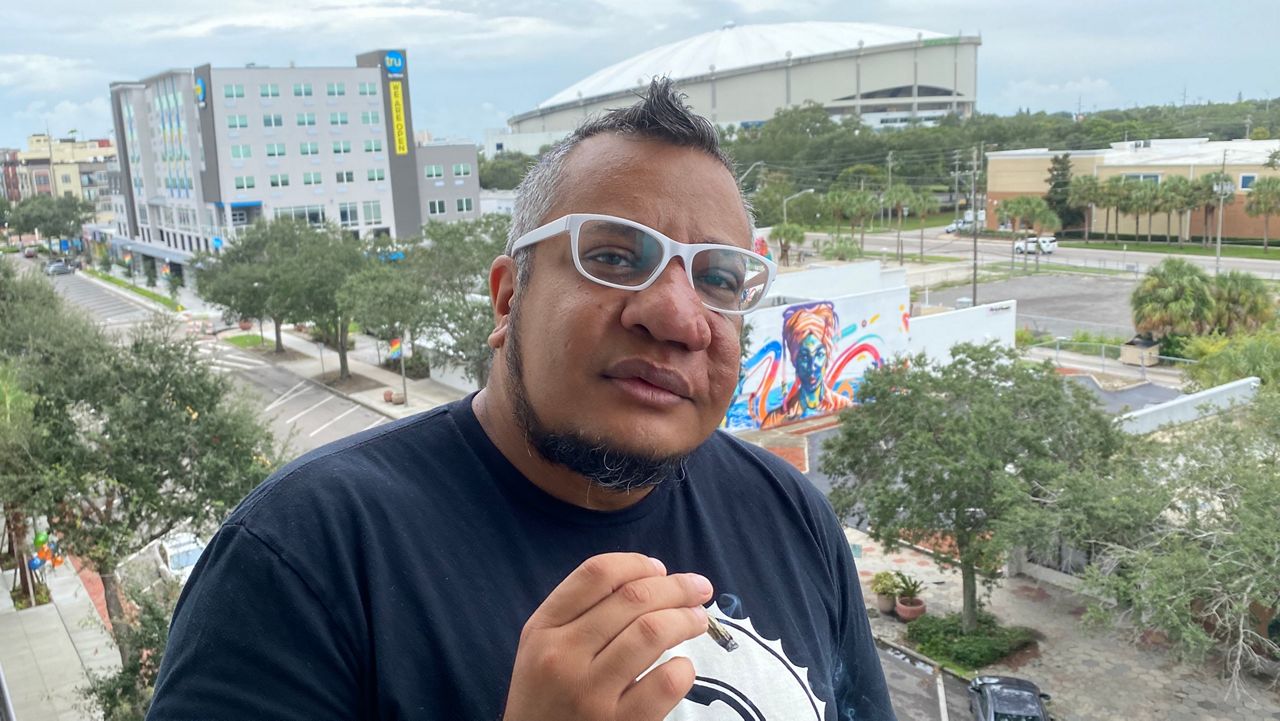ST. PETERSBURG, Fla. — At the beginning of 2020, Moe Suliman was living the American Dream.
The 41-year-old naturalized Egyptian immigrant and U.S. Marine veteran had been working for nearly two years building his own cannabis production company in Canada, where the plant is legal for both medical and recreational use. He’d dealt with the endless red tape that comes with running a business as a citizen of another country. He’d crossed the border endless times, enduring increasing scrutiny and suspicion. He had a team, a facility, and a product.
Then the coronavirus pandemic took it all away — and nearly took his life, too.
What You Need To Know
- St. Petersburg veteran Moe Suliman lost his business and nearly his life to the coronavirus pandemic
- He's rebuilding his company by selling organic hemp cigarettes
- CBD is increasingly popular in the Bay area and beyond
“COVID hit, and then the borders closed,” Suliman says. “Canadians weren’t letting Americans in. And as this was happening, in March, I started getting sick.”
He ended up in the hospital for eight days, spending half of them in the ICU. His fever spiked to 105 and stayed there. Doctors wanted to intubate him, but his body and brain rebelled, making the procedure, often necessary to stabilize COVID patients, impossible.
“On day two in the ICU, they came in and asked if I had a will,” he says. “They asked me what I wanted done with my body, because it wasn’t looking good.”
Suliman learned that he had diabetes and hypertension which had gone undiagnosed; the underlying illnesses were why his battle with COVID was so extreme. As doctors treated those issues, he slowly began to recover.
At the same time, however, the prognosis for his business got worse and worse.
“There was a break in my team in Canada,” he says. “Half of them just walked away when they thought I was gonna die, I guess. And the other half just went and liquidated everything we had. They sold all the equipment, they went to harvest early and we lost about 100 grand worth of product.
“The end result was, half of them walked away and half of them robbed us.”
It took Suliman months to piece together what had happened after he was released from the hospital, as he slowly recovered from his battle from COVID-19. He’d lost a staggering 40 pounds in 12 days, and like many victims of the coronavirus, he suffered lingering effects long after he was cleared by medical personnel.
“I got discharged April 1, and it took at least 60 days before it didn’t feel like I was running a marathon just when taking a shower,” he says.
Though his Canadian operation was a bust, Suliman’s investors were sympathetic. No one could’ve predicted the global pandemic that destroyed so many businesses, and will in all likelihood continue to do so well into the future. Rather than cutting and running, one of his partners suggested he pivot to a similar, less controversial product that’s both fully legal in Florida and readily available in the U.S.: hemp.
A strain of cannabis that contains extremely low levels of THC, the psychoactive compound in marijuana that gets users high, hemp has been used for centuries to make everything from rope to clothing. More recently, millions of Americans have taken to using hemp’s own chemical, CBD, to treat a range of physical or emotional ailments, such as anxiety, insomnia, pain and inflammation. This has created a booming market in CBD oils, tinctures and “edibles” nationwide.

Instead of fighting for market share among the more familiar ways to ingest CBD, Suliman’s SunShine City Flower Co. is starting from scratch by focusing on smokable hemp “flower,” and offering hand-rolled, filtered organic hemp cigarettes.
“We’ve had an amazing response since I announced we were doing this,” says Suliman. “It’s just been really good, fun and exciting, especially after the hit we took in Canada.”
CBD products are seemingly ubiquitous these days, available at every head shop, holistic healing boutique, and online retailer in America. But smokable hemp is much harder to find, due to both its niche appeal and the high quality of hemp required for a product that’s going into a user’s body through the lungs. Suliman sources only untreated organic hemp from small farms in the U.S., and claims that smoking the plant’s flower — what marijuana enthusiasts refer to as “buds” — provides an effect different from and better than the extracts usually taken orally.
“When you burn it, it changes the compound,” he says.
For now, Sunshine City is back to being an extremely low-key, artisanal operation. Suliman rolls the cigarettes himself, and can only produce 75 per day. After his personal and business ordeals, however, he’s happy to be back to building his passion project and says interest is high with retailers around the Tampa Bay area and beyond. There are plans for expansion, and Suliman says he and his investors are definitely eyeing a return to cannabis production, if and when Florida straightens out its convoluted and restrictive policies regarding medical marijuana — or, better yet from a business perspective, makes recreational use legal.
“At the end of the day, just like people have always shifted toward locally-sourced food, it’s the same thing with locally sourced hemp and cannabis,” he says. “You want to be able to shake the hand of the person who grows your cannabis. So people will always choose local over some big, nameless corporation they’ve never heard of. And that’s our plan, to grow organically, no pun intended.”



